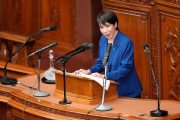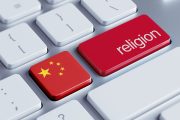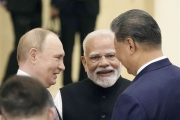
For years China has sought to draw moral equivalence with the West over human rights, insisting that other countries have no standing to criticize its policies. Now Beijing is making Western companies pay for raising ethical concerns.
As hard as many multinational businesses strive to avoid getting pulled into whimsical twists of foreign policy, the reports that China runs forced-labor camps out of Xinjiang — an area that produces about 20 percent of the world’s cotton — made it much harder for corporations to avoid political involvement. With increased fervor on social media demanding businesses take stances on hot-button political issues, China’s monstrous abuse of Uyghur people didn’t go unnoticed.
This week, China fought back. It stepped up pressure on foreign shoe and clothing brands to reject or deny reports of abuses and forced Uyghur labor in Xinjang. State media called for a boycott of Swedish brand H&M and America’s Nike and others for saying they would no longer use cotton from Xinjiang. China also criticized other brands (Adidas, New Balance, Burberry, Massimo Dutti, Calvin Klein, Tommy Hilfiger, Uniqlo) for expressing concern about reports of forced labor. Under pressure from Beijing and their threatened bottom lines, some retailers have retracted their condemnations, and either quietly deleted them from their websites or actually bowed to Beijing and apologized for the criticism. Some others took a stand.
H&M was among the latter, so Chinese platforms not only scrubbed H&M’s clothing listings, but also the company’s addresses and geolocations (the ability of tech products to locate a store). On Weibo, a Chinese social-media site, more than 32 million people used the hashtag “I support Xinjiang cotton.” Millions of comments read “Die, H&M, die” and “Any b—- who still dares to work at this place should also jump off a building.” In a YouTube video published by the China Global Television Network, a network owned by the Communist Party of China, Chinese bystanders across all demographics condemned H&M for its “nonsense” accusations. Dozens of Chinese celebrities openly cut ties with “blacklisted” brands out of national solidarity.
Even though companies have been speaking out against slave labor in China for a while, it is only now that China has aggressively countered the message. The sudden backlash appears to be in retaliation to a recent statement from high-level government officials from around the world. The United States, Canada, the U.K., and the European Union teamed up to condemn China’s human-rights violations toward Xinjiang’s Uyghur minority. And the countries levied sanctions on top Chinese officials, including Wang Junzheng, the secretary of the Party Committee of the Xinjiang Production and Construction Corps (XPCC), and Chen Mingguo, director of the Xinjiang Public Security Bureau (XPSB). According to the U.S. Treasury Department, the XPCC is a paramilitary organization that “enhances internal control over the region by advancing China’s vision of economic development in [Xinjiang] that emphasizes subordination to central planning and resource extraction.” Treasury also notes that “since at least late 2016, repressive tactics have been used by the XPSB against the Uyghurs and members of other ethnic minorities in the region, including mass detentions and surveillance.”
Beijing hit back with a money stick. “When the stick of sanctions is brandished on Xinjiang, it will also hit your own head,” a spokesman for the Xinjiang regional government, Xu Guixiang, said at a news conference in Beijing. According to Bloomberg, shares of H&M, Nike Inc., and others plummeted as Chinese government officials endorsed the boycotts and Chinese celebrities dropped contracts with the brands.
The tensions between the United States and China have increasingly intensified over Beijing’s human-rights record and allegations Xi Jinping’s government is committing genocide against the Uyghur people. The State Department formalized its accusations that China has engaged in “genocide and crimes against humanity” on March 30. The document cites Beijing’s “mass detention” of the Uyghurs, as well as evidence of forced sterilization, rape, torture, and forced labor.
Previously, on January 13, 2021, the U.S. Customs and Border protection announced a ban on all imports of tomato and cotton products “made by slave labor” in Xinjiang. At his first solo news conference, even though President Joe Biden vowed to be “unrelenting” in calling attention to China’s human-rights abuses, his statement followed a confused and eyebrow-raising assertion about the “different cultural norms” that shaped the Beijing’s policies, indicating he really didn’t mean it: “And so the idea I’m not going to speak out against what he [Xi Jinping] is doing in Hong Kong, what he’s doing with the Uyghurs in the western mountains of China and Taiwan, trying to end the One China policy by making it forceful — I said — and by the — he said he — he gets it. Culturally, there are different norms that each country and they — their leaders — are expected to follow,” and reminded that China had been victimized by the West in the past.
Beijing officials vehemently deny accusations of human-rights abuses and initiated a campaign spearheaded by state-owned media outlets on Western social-media platforms, claiming it has not forced Uyghur Muslims to pick cotton and that it has mechanical harvesters.
Among others claims, the Chinese Foreign Ministry tweeted, “Allegations of ‘genocide’ and ‘forced labor’ in Xinjiang are lies of the century. Xinjiang’s Uyghur population more than doubled in the past 40 years. Have you ever seen this kind of genocide?” and it accused the U.S. government of being responsible for native Indians being “expelled” and “slaughtered” 100 years ago.
According to an independent report released on March 8, compiled by more than 50 global experts specializing in international law, genocide, and the China region, the Chinese government’s actions in Xinjiang have violated every single provision in the UN’s Genocide Convention.





